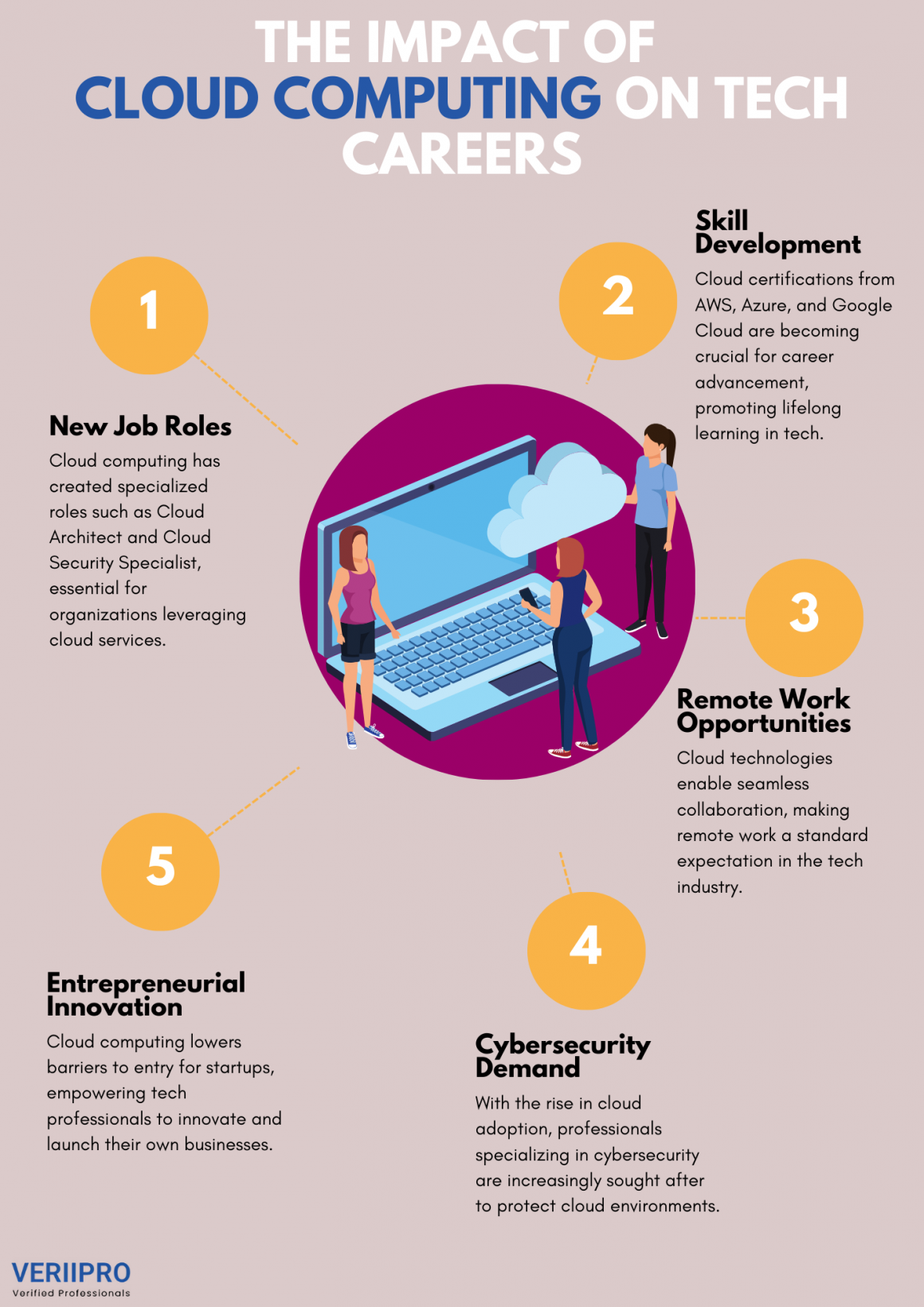The Impact of Cloud Computing on Tech Careers
Introduction
In recent years, cloud computing has transformed the way businesses operate and how tech professionals develop their careers. By providing scalable resources and services over the internet, cloud computing enables organizations to streamline operations, reduce costs, and foster innovation. As a result, tech careers are evolving, with new roles and opportunities emerging across various sectors. In this article, we will explore how cloud computing is reshaping tech careers and what this means for professionals in the industry.

1. New Job Roles and Specializations
The rise of cloud computing has led to the creation of numerous job roles that didn’t exist a decade ago. Positions such as Cloud Architect, Cloud Security Specialist, and Cloud Systems Administrator are in high demand. According to a report from LinkedIn, these roles require specialized skills that combine traditional IT knowledge with cloud technologies.
Cloud architects design cloud infrastructure, ensuring that organizations utilize cloud services effectively. Cloud security specialists focus on protecting data and maintaining compliance with regulations. These new roles not only require technical expertise but also demand strong problem-solving skills and an understanding of business operations.
2. Skill Development and Training
As cloud computing evolves, so must the skills of tech professionals. Organizations increasingly seek employees who possess cloud certifications, such as those offered by Amazon Web Services (AWS), Microsoft Azure, and Google Cloud Platform. These certifications demonstrate a commitment to continuous learning and mastery of cloud technologies.
Tech professionals are now prioritizing training in areas like DevOps, containerization, and serverless architectures. According to a report by Gartner, organizations are investing significantly in upskilling their workforce to remain competitive in a cloud-dominated market. This shift encourages professionals to embrace lifelong learning to adapt to the ever-changing tech landscape.
3. Remote Work Opportunities
Cloud computing has also facilitated the rise of remote work in the tech industry. With cloud-based tools and applications, teams can collaborate seamlessly from anywhere in the world. This flexibility has opened up new job opportunities for tech professionals, allowing them to work for companies across the globe without relocating.
A survey by FlexJobs indicates that remote work options are becoming a standard expectation rather than a perk. As more companies adopt cloud-based solutions, the demand for remote talent is likely to grow, providing tech professionals with greater job flexibility and work-life balance.
4. Increased Focus on Cybersecurity
As businesses move to the cloud, the need for robust cybersecurity measures has never been greater. Data breaches and cyberattacks are on the rise, making it essential for organizations to safeguard their cloud environments. As a result, tech professionals specializing in cybersecurity are in high demand.
Cybersecurity roles related to cloud computing involve securing cloud architectures, ensuring data privacy, and implementing compliance measures. Professionals in this field are expected to stay updated on the latest security threats and best practices. According to a report from Cybersecurity Ventures, the global cybersecurity workforce needs to grow by 65% to effectively combat cyber threats. This presents a significant opportunity for tech professionals looking to enter this field.
5. Innovation and Entrepreneurship
Cloud computing has also fueled innovation, enabling entrepreneurs to launch startups without the hefty upfront costs associated with traditional IT infrastructure. With access to cloud services, tech professionals can develop and deploy applications quickly and efficiently, allowing for greater experimentation and creativity.
Entrepreneurs can leverage cloud-based tools to test ideas, reach customers, and scale their businesses. This trend is particularly beneficial for professionals looking to transition from traditional roles to entrepreneurship. According to Forbes, cloud computing has lowered barriers to entry for startups, making it easier for tech professionals to pursue their entrepreneurial ambitions.
Conclusion
Cloud computing is undeniably reshaping the landscape of tech careers. As new roles emerge, professionals must adapt and upskill to stay relevant in this rapidly evolving environment. With remote work options expanding and a heightened focus on cybersecurity, the opportunities for tech professionals are vast.
Looking for opportunities in tech? VeriiPro is here to help!








